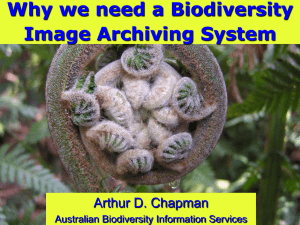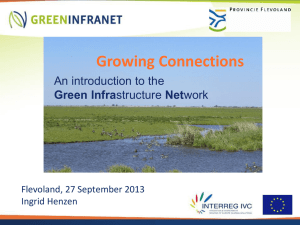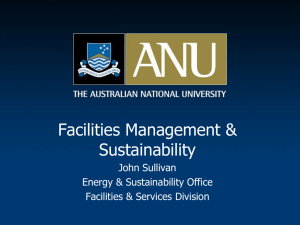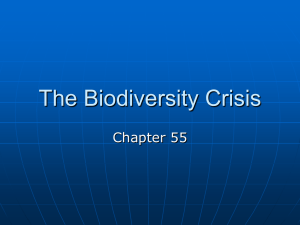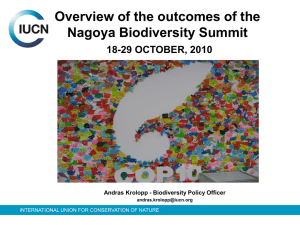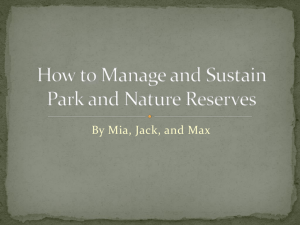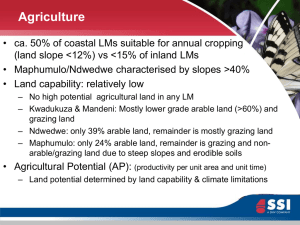Bill.Andrews-Coastal.Biodiversity-Word.summary
advertisement
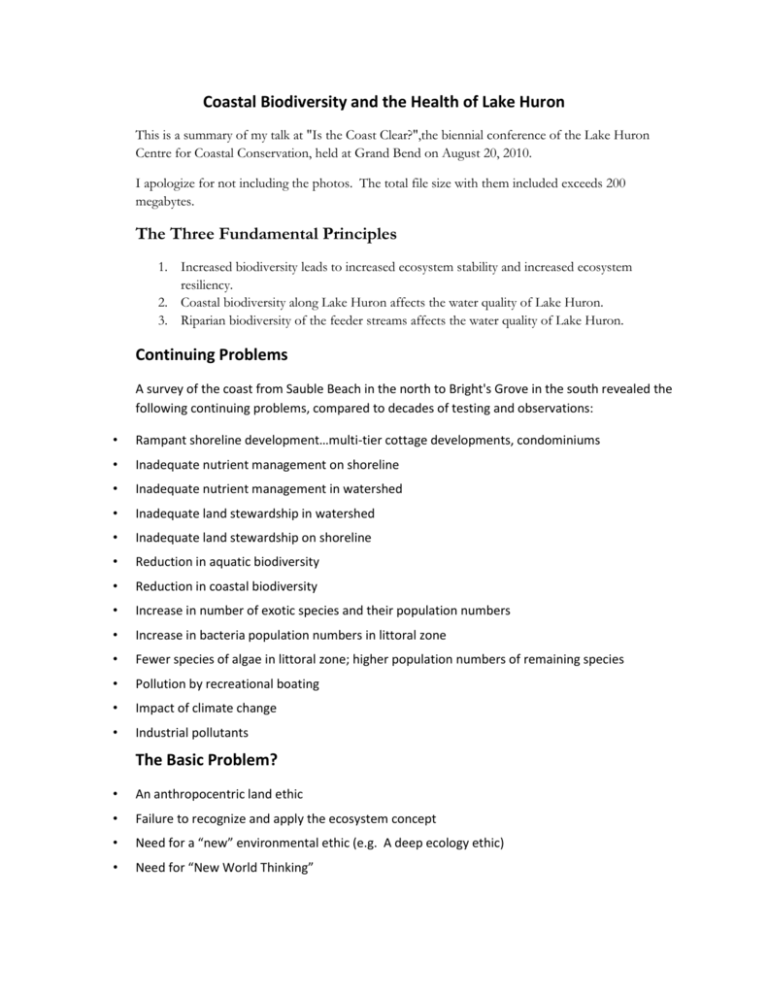
Coastal Biodiversity and the Health of Lake Huron This is a summary of my talk at "Is the Coast Clear?",the biennial conference of the Lake Huron Centre for Coastal Conservation, held at Grand Bend on August 20, 2010. I apologize for not including the photos. The total file size with them included exceeds 200 megabytes. The Three Fundamental Principles 1. Increased biodiversity leads to increased ecosystem stability and increased ecosystem resiliency. 2. Coastal biodiversity along Lake Huron affects the water quality of Lake Huron. 3. Riparian biodiversity of the feeder streams affects the water quality of Lake Huron. Continuing Problems A survey of the coast from Sauble Beach in the north to Bright's Grove in the south revealed the following continuing problems, compared to decades of testing and observations: • Rampant shoreline development…multi-tier cottage developments, condominiums • Inadequate nutrient management on shoreline • Inadequate nutrient management in watershed • Inadequate land stewardship in watershed • Inadequate land stewardship on shoreline • Reduction in aquatic biodiversity • Reduction in coastal biodiversity • Increase in number of exotic species and their population numbers • Increase in bacteria population numbers in littoral zone • Fewer species of algae in littoral zone; higher population numbers of remaining species • Pollution by recreational boating • Impact of climate change • Industrial pollutants The Basic Problem? • An anthropocentric land ethic • Failure to recognize and apply the ecosystem concept • Need for a “new” environmental ethic (e.g. A deep ecology ethic) • Need for “New World Thinking” Lawns and Coastal Biodiversity The way many of us manage our lawns indicates our need for "New World Thinking" and a new environmental ethic. I am frequently asked by lawn owners how to control weeds now that that Pesticide Act prohibits the use of most weed killers. A better question, based on new world thinking and a deep ecology ethic, would be: "How do I get rid of the grass and replace it with a natural garden?" • Biodiversity of a typical lawn? • Plant diversity? • Soil fauna diversity? • Runoff of fertilizer, pesticides, herbicides… • Water consumption • Effects on coastal biodiversity? • Animal Habitat? • Provide Habitat with native perennials and shrubs I showed here before-and-after photos of my Toronto lawn, as I converted from a traditional monoculture grassy lawn to a perennial garden dominated by native species. Septic Systems and Coastal Biodiversity • Antiquated systems • Inadequately-sized systems • Improperly located systems • Poorly maintained systems • Municipal regulations and enforcement • Conversion to year-round use • Effects on coastal biodiversity? Shoreline Alterations and Coastal Biodiversity WHY ARE THEY DONE? • To improve swimming conditions • To create/enlarge boat mooring EFFECTS ON COASTAL BIODIVERSITY? • Spawning areas? Plant/algal diversity? • Fish population numbers? • Fish species diversity? • Disruption of natural shoreline processes? Marinas and Coastal Biodiversity • Loss/partial loss of coastal wetlands • Highest biodiversity of Canadian ecosystems • Disturbance of surviving wetland species (motion; noise…) • Water and air pollution Dune Preservation/Rehabilitation and Coastal Biodiversity • Develop public appreciation of uniqueness • Public education re preservation/rehabilitation • More active rehabilitation…public involvement • Clearly posted preservation policies • ENFORCEMENT! Urban Areas and Coastal Biodiversity Sewage treatment/disposal Lawns Septic systems Watershed Agriculture and Coastal Biodiversity Land Management Issues Soil erosion Nutrient runoff to streams and aquifers Pesticide/herbicide runoff to streams and aquifers Manure Management Nutrient input to streams and aquifers Stream/aquifer contamination by pathogenic protozoans, viruses and bacteria Likely Path of Runoff From a drained wetland that is now a soybean field: Soybean field Lake Huron ‘Pond’ Field Drainage System Maitland River Roadside ditch or municipal drain Belgrave Creek Other Impacts on Coastal Biodiversity • Industrial/hazardous wastes • Sport fishing • Commercial fishing • Insect pests and diseases • Climate change • PEOPLE!! Climate Change and Coastal Biodiversity INCREASE IN AIR TEMPERATURE Increase in water temperature Increase in evaporation Increase in precipitation (quantity) Increase in beach use Increase in tourism Longer camping/cottage seasons Increase in stability/resiliency of dune ecosystems (if protected) Decrease in water quality Less ice cover (more evaporation & shoreline erosion) Decrease in lake levels • Climate Change and Coastal Biodiversity LOWER LAKE LEVELS Disruption of shoreline processes ( increased erosion; disrupted longshore movement of sand; reduced rebuilding of beaches; reduced rebuilding of dunes…) More beach but less aesthetically pleasing Reduced fish spawning and nursery areas Marinas! Cottagers! At this point, I did a photographic tour of beaches from Sauble Beach to Bright's Grove, and included data from local Health Departments and Conservation Authorities to give an indication of water quality at the chosen sites. I don't feel that I should post here the data that I used without permission. Please use the Internet to see the data (and more recent data) directly. If you want to see the things that I have done in my riverflats to help improve water quality, let me know. I am always eager to give an on-site tour. Ways to Improve Beach Water Quality The Ministry of the Environment recommends these actions: • Upgrade septic systems and keep them in good working order. • Pet owners should observe local ‘stoop and scoop’ bylaws and remove dog droppings immediately. from city streets, public parks and private property • Where appropriate, detach eaves troughs from sewers so they discharge onto lawns. This reduces the amount of rainwater going directly into sewers. • Reduce your household water use. This helps capacity problems at some municipal sewage treatment plants. • Ensure that washroom additions to your home are connected properly to the sanitary sewer pipes. • In agricultural areas, fence livestock away from streams and provide them with alternate water sources. This will benefit herd health and the environment. • Ensure that runoff from feedlots and manure piles are properly contained. Bill Andrews adds these recommendations: • Replace lawn with a “natural” garden; at the very least, stop fertilization, watering, and pesticide use. • Avoid walking on dunes and other fragile environments. • Advocate for high quality sewage treatment for your community, and be prepared to pay for it. • Advocate for more funds for Conservation Authorities ... and be prepared to pay your share. • Advocate for more funds local Health Units ... and be prepared to pay for it. The free ride has been over for decades! How to Contact me: www.bill-andrews.com 416-429-2786 (Toronto) 519-357-1696 (North Huron)

